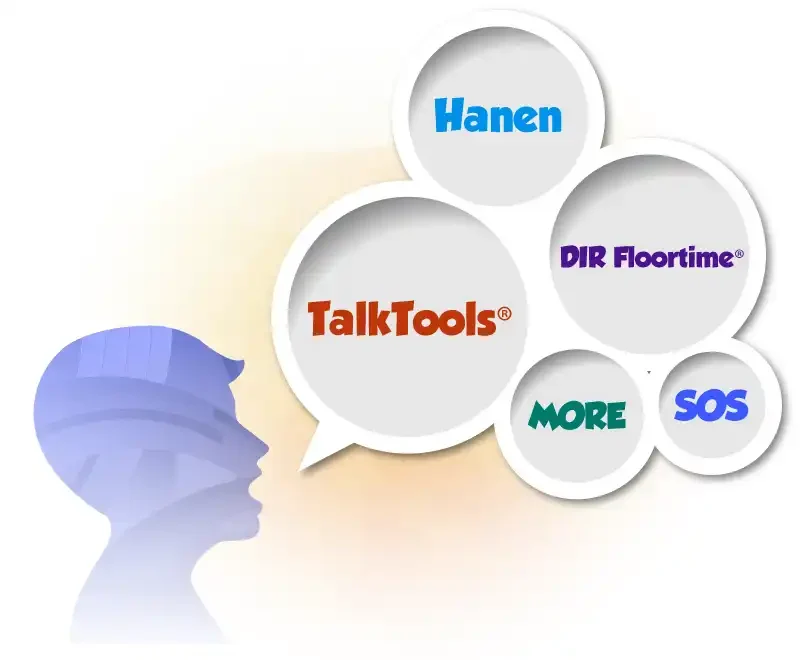Every child is different, and therefore we provide an individualized intervention plan. We maximize progress in speech, language and communication by combining the most recent evidence based research and treatment methods.

We maximise the child’s progress in speech, language and communication by combining the latest and most effective treatment methods. Our Speech-Language Therapists are trained and experienced in a variety of popular treatment modalities, which include:
- Hanen Programs
- It Takes Two To Talk
- More Than Words
- TalkAbility
- Social Thinking
- PECS (Picture Exchange Communication System)
- DIR Floortime®
- Sequential Oral Sensory (SOS) Approach to Feeding
- Lidcombe Program
- Nuffield Dyspraxia Program
- PROMPT
- TalkTools®
Key collaborations are important in the child’s therapeutic journey at Dynamics Speech. We strongly believe that parents and caregivers play a vital role in the success of the child’s therapy. They can provide support and reinforcement in learning when the child is at home. As such, we actively partner with the child’s parents and/or primary caregivers and support them through parent training, relevant resources and maintain regular and open communication throughout the child’s therapy.
We also ensure the child receives integrated care and support, if needed, through seamless and effective collaborations with Dynamics’ in-house multidisciplinary team of healthcare professionals.
Assessment and Therapy Services
At Dynamics Speech, we specialise in diagnosing and treating children with:
- Speech Disorder (Articulation, Phonology, Dysarthria or Apraxia of Speech)
- Language Disorder (Developmental or Acquired Language Disorder)
- Feeding, Eating, Drinking and Swallowing Difficulties (Fussy Feeding or Dysphagia)
- Social Communication Disorders
- Oromotor Difficulties
- Fluency (Stammering or Stuttering)
- Voice Disorders (Dysphonia)
- Hearing Impairment
Our experienced Speech-Language Therapists provide empathetic, inclusive and high-quality therapeutic services for children. Each child’s therapy is personalised to enhance the effectiveness and success of the intervention. We endeavour to create a conducive, engaging and safe environment to enable every child to enjoy a positive and meaningful learning experience.
Our therapy sessions are conducted either one-one or in a group setting. During our sessions, we implement fun exercises and activities to build language skills, encourage interactions, model sounds/syllables and more. We also use specialised materials and equipment to aid in the intervention.
Feeding Therapy
Feeding skills are vital to ensure that the child receives essential and adequate nutrients for their development. Eating and drinking are also key tasks that we perform daily in different settings, e.g. at home, school or work, and can affect how we interact with others and our environment.
However, some children may experience feeding difficulties, such as:
- Frequent gagging, choking or vomiting during meals
- Refusal to try new foods
- Picky or fussy eating (eating only certain foods or has a food range of fewer than 20 types of foods)
- Being difficult to feed, with mealtimes often lasting longer than 30 minutes
- Require entertainment, e.g. iPad or television, during mealtimes
Feeding difficulties can also be caused by other developmental disorders, such as Autism Spectrum Disorder (ASD), Global Developmental Delay or Cerebral Palsy.
For children experiencing the above-mentioned issues, we would recommend a Feeding Assessment to first ascertain the condition. During the assessment, our Speech-Language Therapist will conduct an in-depth interview with the parents, observe the child’s eating and drinking abilities and may implement trial strategies that can help improve the child’s feeding skills. Depending on the outcome of the assessment, Feeding Therapy might be recommended.
Feeding Therapy can be conducted in an individual or group setting. During these sessions, our therapists may use behaviour modification and/or the Sequential Oral Sensory (SOS) Approach to Feeding. The SOS approach is a play-based method that helps fussy eaters develop a positive relationship with food. It aims to increase interactions with a variety of food through systematic desensitisation.
Treatment for Feeding and Swallowing Disorders in Adults
Our Speech-Language Therapists also diagnose and remediate feeding and swallowing disorders (Dysphagia) and other communications disorders facing adults. Learn more about our Speech Therapy services for adults here.
Service Delivery Models
To enhance flexibility and peace of mind and to cater to unique needs and preferences, we provide our services using various service models:
- Centre-Based Therapy
- Therapy @ Home
- TeleHealth (online)
- Hybrid Therapy (a combination of the above models)
Schedule an appointment with our Speech-Language Therapist to find out how we can help your child overcome speech, language and/or communication challenges.
Get Started
Are you an awesome Speech Therapist?